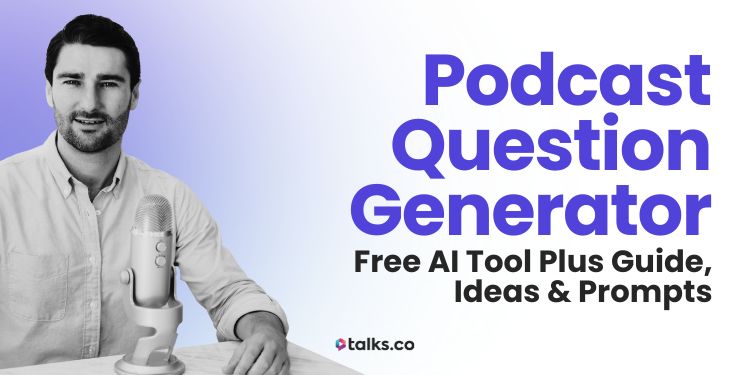If you’re here, I’m guessing you have something to say… You just need a clear way to say it on a podcast.
Maybe you’re a coach, consultant, or expert who’s been invited to speak on shows (or wants to be), and you want to sound sharp, not scripted. Or you’ve got your own show and you’re trying to line up a few talking points before hitting record.
Either way, the last thing you want is to ramble or freeze up. A solid script helps you sound sharp without sounding robotic.
That’s where a podcast script generator comes in handy. And yes, I made one inside Talks, because I wanted something fast, flexible, and actually useful, especially for creators like us who value clarity over fluff.
In this guide, I’ll show you what makes a good script, how to use the tool, and how to get your message across with confidence even if you’ve never written a podcast script before.
Let’s make this easy. You’ve got the expertise. Now let’s make sure your message lands.
What Is a Podcast Script?

A podcast script is your behind-the-scenes game plan. It’s less about reading word-for-word and more about knowing what you’re saying, where you’re going, and how to stick the landing.
It can be a full script, bullet points, or a rough outline. The goal is simple: help you stay focused, sound natural, and deliver value without going off-track.
Whether you’re the host or the guest, having a script saves time, cuts nerves, and makes you sound way more confident on the mic. That’s what makes a really good podcast.
What Is a Podcast Script Generator?
A podcast script generator gives you a starting point. You plug in a few details like your topic, audience, or call-to-action, and it gives you a ready-made script or outline you can tweak and use right away.
No need to overthink. No need to “be a writer.” Just solid structure and ideas you can run with.
At Talks, I built ours for experts like you: coaches, consultants, and creators who want to sound good without spending hours scripting from scratch.
Podcast Intro Generator vs Podcast Script Generator
They’re similar, but not the same.
- A podcast intro generator focuses just on the podcast introduction script, helping you hook your listeners, set the tone, and explain what the episode’s about.
- A podcast script generator goes broader. It helps with your full flow from intro to main points to CTA. It’s ideal for episode planning, guest interviews, solo shows, or even guest appearances on other podcasts.
You can use both together to craft compelling podcast content – intro first, then build out the rest of the episode from there.
How Does a Podcast Script Generator Work?
It’s simple. You fill in a few quick prompts like your episode topic, who you’re talking to, and what you want them to do after listening, and the generator gives you a structured script you can use straight away.
You’ll usually get a mix of:
- A catchy intro
- A breakdown of your key points
- Transition ideas
- A clear CTA
You can copy, tweak, and make it sound like you, but it takes care of the heavy lifting so you’re not starting from scratch.
And with the Talks podcast script generator, you don’t even need to sign up. Just go to the page and start creating.
Best Podcast Script Generator: The Talks Free Tool!
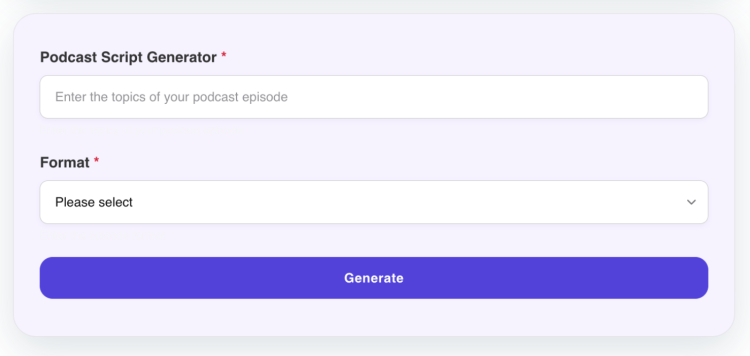
The pressure to “sound good” on a podcast is real, especially when you’re trying to build authority in your niche. But the truth is, most people don’t struggle with talking. They struggle with starting.
That’s why the Talks podcast script generator works so well.
It’s not here to write your whole show for you. It gives you just enough structure to get moving. No awkward silences. No rambling. No last-minute scrambling to figure out what to say next.
You pop in your topic, pick your format (solo, co-hosted, or guest interview), and you’ve got a custom script you can actually use.
What makes it the best?
- It saves your brainpower for the stuff that matters. You can focus on delivering value, not figuring out how to open your episode.
- It gives you structure without boxing you in. You still get to be yourself, just with a clear flow that keeps your message sharp.
- It’s made for non-techy experts. No dashboards. No downloads. No ads. Just a script that gets you from idea to recording scripts on any topic for your next podcast episode fast.
This tool isn’t trying to be flashy. It’s a user-friendly AI-powered tool designed to help you learn how to write high-quality podcasts without any hassle.
If you need help with other parts of your podcast, try a podcast name generator and a podcast title generator to get more content in minutes.
How to Make a Podcast Script
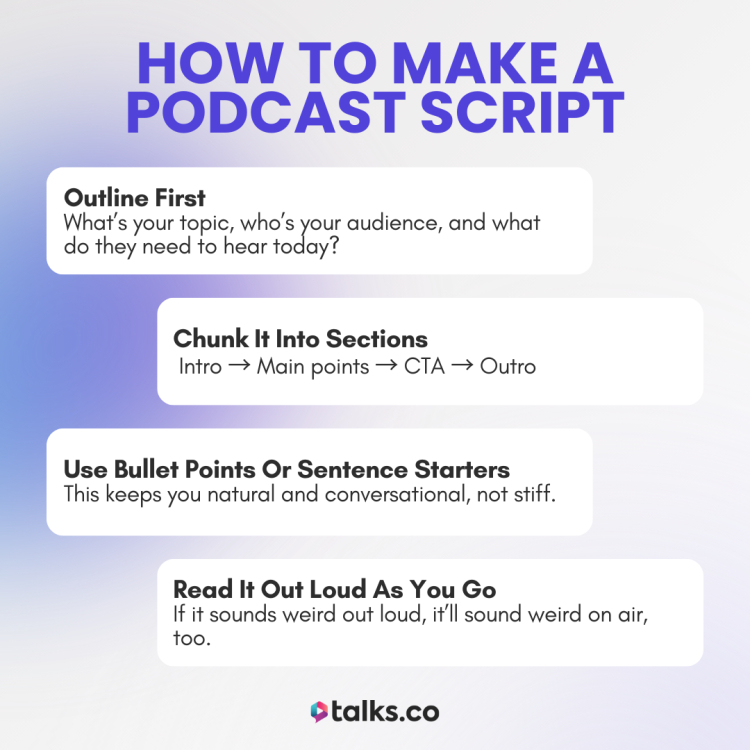
If writing your podcast script feels overwhelming, keep this in mind: you’re not writing a novel. You’re writing to speak.
Here’s how to write a simple, speakable script:
- Outline first. What’s your topic, who’s your audience, and what do they need to hear today?
- Chunk it into sections. Intro → Main points → CTA → Outro.
- Use bullet points or sentence starters. This keeps you natural and conversational, not stiff.
- Read it out loud as you go. If it sounds weird out loud, it’ll sound weird on air, too.
A good script supports your flow, not slows it down.
How to Start a Podcast Script
The first few lines of your episode matter. They set the tone and hook your listeners.
Here’s how to start your podcast script strong:
- Begin with a quick intro. Your name, your show, and a one-liner about what today’s episode covers. You can also use a podcast introduction script.
- Drop a teaser. Hint at something juicy coming up, so people want to stick around.
- Keep it short. 20-30 seconds max is more than enough.
Example: “Hey, I’m Alex, and this is The Expert Edge. Today, we’re digging into how to grow your coaching business without ads and why most people are doing it backwards. Let’s get into it.”
You’re not just starting the episode, you’re inviting your audience in.
How to Write a Podcast Script in 10 Steps
Think of your script like a game plan, not a word-for-word script to read, but something that keeps your ideas clear, focused, and flowing.
Here’s a simple formula to get you started:
- Start with your core topic: What’s the episode about? Nail down the main theme.
- Outline key points: Break it into simple segments you want to cover.
- Write your intro: Make it punchy and clear. Let listeners know what to expect.
- Introduce your guest: Keep it brief but informative. Why are they here?
- Use smooth transitions: Add a few phrases to make the episode flow between segments.
- Summarize key takeaways: Recap the main points for clarity.
- Finish with your outro: Tease the next episode, share resources, or thank your listeners.
- Include a call to action: Ask your audience to take one clear action (e.g., leave a review, follow you).
- Add your personality: Share personal stories or highlights to connect with your audience.
- Tailor to your style: Whether you like structure or freestyle, make the script fit how you work.
How to Generate a Podcast Script
Not every episode needs a full-blown script, but when you’ve got a packed schedule or good podcast topics you want to nail, generating one can save serious time (and stress).
Here’s when using a script generator makes the most sense:
- You’re prepping solo episodes and want to stay on track.
- You’ve got a guest interview but need a clear flow.
- You’re testing a new content style and need structure.
To get the best results from a generator:
- Be specific with your topic (e.g., “how health coaches can raise their prices” vs “coaching”).
- Choose the right format – solo, co-hosted, or interview – so the script matches your delivery style.
- Make small edits to match your voice. Don’t read it word-for-word unless that’s your thing.
The goal isn’t perfection. It’s to give you a solid base so you can record faster and sound more like you actually know what you’re doing, because you do.
How to Use a Podcast Script Generator
Want to skip the blank page and get a head start? Use a podcast script generator like the one on Talks.
You’ll just need two things:
- The topic you’re talking about.
- The format of your episode (solo, co-hosted, or guest interview).
Plug those in, hit generate, and you’ll get a ready-to-use script that gives your episode structure from start to finish.
It’s fast, it’s free, and it’s designed for coaches, experts, and entrepreneurs who want to sound polished without spending hours planning.
5 Benefits of a Podcast Script Generator
A podcast script generator isn’t just a time-saver – it can actually make you a better host. Here’s what it brings to the table:
- Cuts prep time in half. Instead of staring at a blank doc for hours, you get a full episode structure in seconds. Just tweak and go.
- Helps you sound more confident. When you know what you’re going to say, you stop rambling and start leading. Listeners notice.
- Keeps your message focused. A good script keeps your main points sharp so you don’t go off on 12 different tangents.
- Supports consistency. Using a script means your episodes follow a reliable format. It’s also easier for you to produce and easier for your audience to follow.
- Great for batching content. If you like recording multiple episodes at once, having pre-written scripts makes batching smoother and faster.
10 Topics to Help You Brainstorm Faster with a Podcast Script Ideas Generator

Sometimes the hardest part for content creators isn’t recording… It’s coming up with what to say that will captivate your target audience.
If you’re stuck writing scripts for your podcast, here are a few solid starting points when using the podcast script generator:
- A common client struggle or FAQ you get all the time.
- Your step-by-step process or signature method.
- Behind the scenes of how you run your business.
- A story from your own journey on wins, losses, or lessons.
- A hot take on something happening in your industry.
- A tool or resource you swear by (and why).
- A myth or mistake you see people making.
- Tips to help your audience get quicker wins.
- Guest expert insights or a summary of what you learned.
- Breakdowns of your most popular content.
You don’t need to overthink it. Start with one idea, plug it in, and see where it takes you.
10 AI Podcast Script Generator Prompts to Use
Want better results from a podcast script generator? Give it better input. Try to copy and paste prompts like these to help you create podcast scripts with ease:
- “5 mistakes new [your niche] coaches make and how to fix them.”
- “How I [achieved result] without [common struggle].”
- “The behind-the-scenes of launching my [program/product/service].”
- “The one mindset shift that changed everything in my business.”
- “A day in the life of a [your role] — what I actually do.”
- “3 things I wish I knew before I started [your niche].”
- “How to get your first [client/sale/result] without paid ads.”
- “What most people get wrong about [industry myth or trend].”
- “My top 3 tools for staying productive as a [coach/speaker/etc].”
- “Why [your unpopular opinion], and what I’ve learned from it.”
Feel free to tweak these to match your tone and podcast content.
Podcast Script Generator Tips
Even the best AI tool needs a little help from you. Here’s how to get better results from any podcast script writer or podcast generator.
What to do before hitting “generate”
Don’t skip this. A clear input = a better output.
- Know your topic. Be specific, not vague. (“How coaches get high-ticket clients” works better than just “coaching.”)
- Pick your format: solo, co-hosted, or guest interview. Each needs a different tone and structure.
- Think about your listener. What do they want to walk away with?
A few extra seconds here saves you 20 minutes of editing later.
Editing tips for natural flow

Your script isn’t set in stone. Tweak it to sound like you.
- Read it out loud: Does it sound too AI-generated? Use tools like NaturalReader or Speechify to catch awkward phrasing.
- Cut anything unnatural: Grammarly and Hemingway Editor can help simplify your script.
- Add personal stories: Record your ideas with Otter.ai or Rev.com for authentic moments.
- Smooth transitions: Use Descript to edit and polish your flow.
- Keyword research: Use AnswerThePublic or Google Trends to ensure you’re covering the right topics for your audience.
- Trust your gut: Record a quick voice memo to hear how it sounds.
If you’re second-guessing a line, trust your gut and rewrite your podcast transcript.
How Long Should a Podcast Script Be?
There’s no magic number when it comes to how long a podcast should be. It really depends on your format and your speaking style. But here’s a rough guide:
- Short solo tip episode (5-10 min): ~300–600 words
- Standard interview or solo show (20-30 min): ~1,500–2,000 words
- Deep dive (45-60+ min): ~3,000–4,000+ words
Pro tip: Aim for structure over word count when you do a podcast interview. Make sure your episode has a clear beginning, middle, and end – that matters more than the length.
Why Is a Good Podcast Episode Script Important?
Because great content isn’t made up on the spot. A solid podcasting script:
- Keeps you focused on the topic of your podcast.
- Helps you sound prepared (not robotic).
- Reduces editing time.
- Improves listener experience.
- Makes repurposing content way easier.
You don’t need to follow it word for word – just use it to stay sharp and clear.
How to Pick a Podcast Script
Not all scripts are created equal. Here’s how to choose or create one that actually works for your show:
- Match your format. Solo, guest interview, or co-hosted shows all need different pacing.
- Stick to your style. Your voice, tone, and audience should shape the script. Don’t force yourself into someone else’s format.
- Look for structure. A good script covers the essentials: hook, intro, main points, transitions, outro, and CTA.
- Leave space for personality. The best scripts give you room to breathe, riff, and be human.
If it reads like a lecture, toss it. You’re not running a classroom, you’re having a conversation. Still not liking the direction of your podcast script? Check out more podcast script templates here.
Podcast Script Ideas List When You’re Blanking Out

Need fresh material that’s still on-brand and speaks directly to your audience? Here are more plug-and-play podcast script ideas you can use with the Talks generator:
1. Storytelling and personal reflection
These prompts are perfect for sharing experiences, lessons learned, and personal stories that create deeper connections with your audience.
- “The worst advice I ever followed (and how I recovered).”
- “The exact moment I knew I was on the right path.”
- “This thing used to scare me. Now? It fuels me.”
- “The moment everything changed for me.”
- “What I wish people knew about success before they chase it.”
- “A weird trick I use to get unstuck when I’m spiraling.”
2. Client and business success

Focus on lessons, tips, and insights directly tied to your clients’ wins and business breakthroughs. This pack is great for creating episodes that highlight actionable advice.
- “3 things I stopped doing that actually helped me grow faster.”
- “This mistake almost cost me a client. Here’s how I handled it.”
- “One of my clients flipped this switch, and everything changed.”
- “A recent convo that changed how I think about [topic].”
- “The advice I always give, even if people don’t like hearing it.”
3. Teaching and advice
Want to teach or give advice? These prompts let you drop knowledge bombs your audience will appreciate while adding value.
- “If I had 30 minutes to teach you something that could change your life, this is what I’d say.”
- “The one mindset shift that changed everything in my business.”
- “3 things I wish I knew before I started [your niche].”
- “If I could only teach one thing for the rest of my career, it would be this.”
- “What most people get wrong about [industry myth or trend].”
4. Behind-the-scenes and authenticity
Go behind the curtain and show the reality of running your business, the highs and lows, and what you really do on a day-to-day basis.
- “What I’ve learned from my biggest failure.”
- “A day in the life of a [your role] and what I actually do.”
- “The behind-the-scenes of launching my [program/product/service].”
- “Here’s what most bios won’t tell you about my journey.”
- “This tool/resource helped me achieve [specific goal].”
5. Unpopular opinions and hot takes
Bring the heat! Challenge the status quo, share your contrarian views, and spark some debates with these prompts.
- “Why [your unpopular opinion], and what I’ve learned from it.”
- “What I think about [industry trend] and why it’s not as great as everyone says.”
- “How to get your first [client/sale/result] without paid ads.”
- “Why I’m against [common business practice], and here’s why.”
- “The one thing I don’t do that most people tell you to do.”
Podcast Script Examples
Need a little inspiration before hitting record? These podcast script examples show you what a well-structured, engaging episode can sound like.
Use these samples to guide your next episode or plug similar prompts into our free podcast script generator to create your own version in seconds.
Podcast script example for students
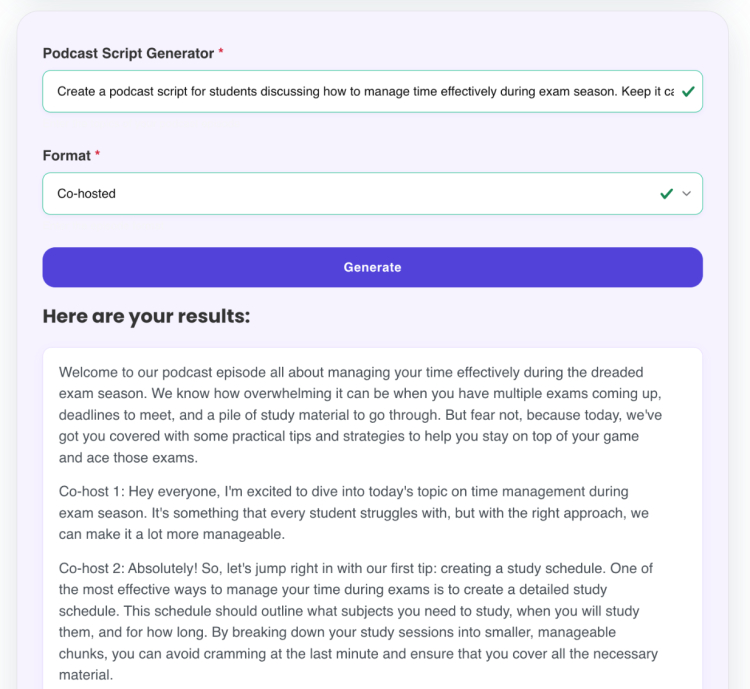
Intro: Welcome to our podcast episode all about managing your time effectively during the dreaded exam season. We know how overwhelming it can be when you have multiple exams coming up, deadlines to meet, and a pile of study material to go through.
But fear not, because today, we’ve got you covered with some practical tips and strategies to help you stay on top of your game and ace those exams.
Co-host 1: Hey everyone, I’m excited to dive into today’s topic on time management during exam season. It’s something that every student struggles with, but with the right approach, we can make it a lot more manageable.
Co-host 2: Absolutely! So, let’s jump right in with our first tip: creating a study schedule. One of the most effective ways to manage your time during exams is to create a detailed study schedule. This schedule should outline what subjects you need to study, when you will study them, and for how long. By breaking down your study sessions into smaller, manageable chunks, you can avoid cramming at the last minute and ensure that you cover all the necessary material.
Co-host 1: That’s a great point! And our second tip is to eliminate distractions. When you’re studying, it’s important to create a conducive environment that is free from distractions. Put away your phone, turn off social media notifications, and find a quiet place where you can focus. By minimizing distractions, you can maximize your study time and retain information more effectively.
Co-host 2: And finally, our third tip is to take breaks. It’s crucial to give your brain some downtime during study sessions. Make sure to schedule short breaks in between study sessions to recharge and avoid burnout. Whether it’s going for a walk, grabbing a snack, or simply taking a few minutes to relax, incorporating breaks into your study routine can help improve your focus and productivity.
Co-host 1: Remember, managing your time effectively during exam season is all about finding a balance between studying and taking care of yourself. Don’t forget to prioritize self-care, get enough rest, and stay hydrated. And most importantly, believe in yourself and your abilities. You’ve got this!
Co-host 2: That’s right! So, as you navigate through exam season, remember to stay organized, stay focused, and stay positive. You have the power to succeed, and with the right time management strategies in place, you can conquer those exams like a boss. Good luck, and may the grades be ever in your favor!
Outro: Thank you for tuning in to our podcast episode on managing time effectively during exam season. We hope you found our tips helpful and that you feel more prepared to tackle your exams with confidence. Remember, you’ve got what it takes to succeed. Stay motivated, stay resilient, and above all, believe in yourself. Until next time, happy studying!
This script is perfect for a co-hosted student-focused show on surviving exam season without burning out. It opens with empathy, dives into three actionable tips (study schedules, cutting distractions, and taking breaks), and wraps with motivation and encouragement.
Use this as a format to create supportive content for school audiences or peer-driven shows.
Want your own version? Try prompting: “Create a podcast script for students about staying focused during exams.”
Podcast script sample
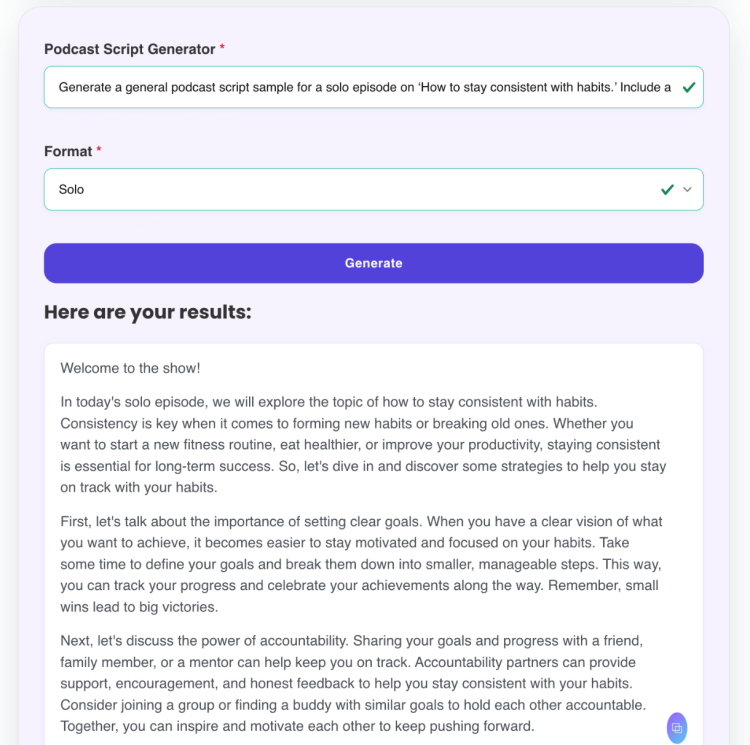
Intro: Welcome to the show! In today’s solo episode, we will explore the topic of how to stay consistent with habits. Consistency is key when it comes to forming new habits or breaking old ones. Whether you want to start a new fitness routine, eat healthier, or improve your productivity, staying consistent is essential for long-term success. So, let’s dive in and discover some strategies to help you stay on track with your habits.
Main point 1: First, let’s talk about the importance of setting clear goals. When you have a clear vision of what you want to achieve, it becomes easier to stay motivated and focused on your habits. Take some time to define your goals and break them down into smaller, manageable steps. This way, you can track your progress and celebrate your achievements along the way. Remember, small wins lead to big victories.
Main point 2: Next, let’s discuss the power of accountability. Sharing your goals and progress with a friend, family member, or a mentor can help keep you on track. Accountability partners can provide support, encouragement, and honest feedback to help you stay consistent with your habits. Consider joining a group or finding a buddy with similar goals to hold each other accountable. Together, you can inspire and motivate each other to keep pushing forward.
Main point 3: Lastly, let’s explore the concept of self-discipline. Building habits requires discipline and commitment. It’s important to create a routine that aligns with your goals and prioritize your habits in your daily schedule. Start small and gradually increase the intensity or duration of your habits over time. Remember, consistency is about progress, not perfection. Be kind to yourself on this journey and embrace the process of growth and self-improvement.
Outro: As we wrap up today’s episode, I encourage you to reflect on your current habits and identify areas where you can improve consistency. Remember, change takes time, so be patient with yourself as you work towards your goals. Stay focused, stay motivated, and remember that every small step you take brings you closer to the life you desire.
CTA: Thank you for tuning in today. If you enjoyed this episode, please share it with a friend who might benefit from these insights. And don’t forget to subscribe for more episodes on personal development and growth. Until next time, keep striving for progress and staying consistent with your habits. Take care and have a wonderful day!
This solo podcast script focuses on building consistent habits, perfect for a self-development, mindset, or wellness podcast. The structure is simple and clean, starting with an intro, moving through three key ideas (goal setting, accountability, self-discipline), and wrapping with a positive, encouraging call-to-action.
Ideal for solo podcasters who want to share tips in a focused and motivating way.
Prompt idea: “Create a solo podcast script on how to build consistent habits with 3 tips and a closing reflection.”
Free Podcast Script Generator Done-for-You Formula
If blank screens stress you out, use this quick formula with the Talks generator to get a high-quality script without the guesswork:
- Enter your topic. Be specific. Example: “3 ways to build trust with new coaching clients.”
- Choose your format. Solo episode, co-hosted convo, or guest interview.
- Hit generate. You’ll get a script that includes your intro, main points, transitions, and outro.
- Edit for your voice. Add personal stories, swap out phrases, tweak the tone
- Record. Script in hand, confidence high, mic on.
It’s basically your outline, talking points, and flow all sorted. No overthinking, no rambling, no filler.
Your Voice, Streamlined
A podcast script generator is your secret weapon to creating polished, engaging episodes without the stress. Whether you’re a solo host, working with a co-host, or interviewing guests, this tool simplifies the process and gets you ready to record faster than ever.
But why stop there?
Take it one step further and unlock even more growth and benefits by creating your free Talks creator profile today.
With your profile, you’ll have easy access to even more tools, resources, and support that can turbocharge your podcast, making it easier to grow your audience, stay consistent, and finally share your unique voice with the world.
Get your free Talks creator profile today!

